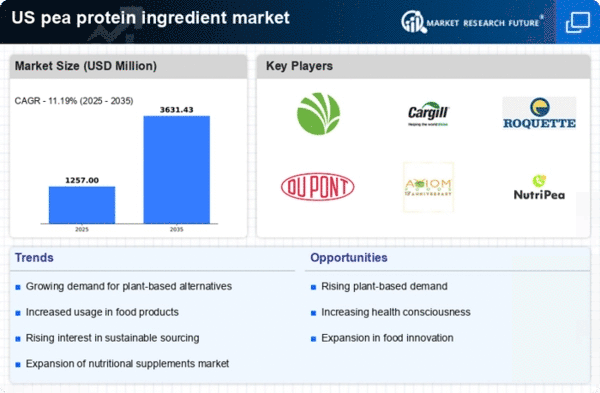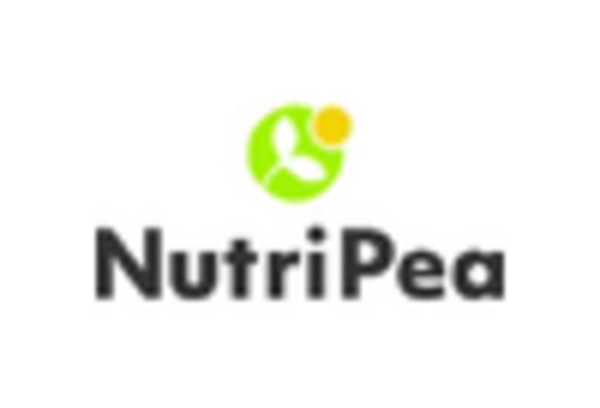Increased Consumer Awareness
The growing awareness among consumers regarding health and nutrition is a pivotal driver for the pea protein-ingredient market. As individuals become more informed about the benefits of plant-based diets, the demand for pea protein ingredients is likely to rise. This shift is reflected in market data, indicating that the plant-based protein sector has experienced a growth rate of approximately 20% annually in recent years. Consumers are increasingly seeking alternatives to animal-based proteins, which positions pea protein as a favorable option due to its high protein content and nutritional profile. The pea protein-ingredient market is thus witnessing a surge in product innovation, with manufacturers developing new formulations that cater to health-conscious consumers. This trend suggests that the market will continue to expand as more individuals prioritize their dietary choices and seek out healthier alternatives.
Innovations in Food Technology
Advancements in food technology are playing a vital role in shaping the pea protein-ingredient market. Innovations such as improved extraction methods and processing techniques are enhancing the quality and functionality of pea protein ingredients. This is particularly relevant as manufacturers strive to meet the increasing demand for high-quality plant-based proteins. Recent studies indicate that the functional properties of pea protein can be optimized through these technological advancements, leading to better emulsification and foaming capabilities. As a result, the pea protein-ingredient market is likely to see a rise in applications across various sectors, including sports nutrition and functional foods. The ongoing research and development efforts in food technology suggest that the market will continue to evolve, offering new opportunities for growth and product differentiation.
Supportive Regulatory Environment
A supportive regulatory environment is emerging as a significant driver for the pea protein-ingredient market. Regulatory bodies in the US are increasingly recognizing the benefits of plant-based proteins, leading to favorable policies that encourage their use in food products. This regulatory support is crucial for manufacturers looking to innovate and expand their product lines. Recent initiatives aimed at promoting plant-based diets align with public health goals, further bolstering the market's growth potential. The pea protein-ingredient market is likely to benefit from these developments, as regulations become more accommodating to the incorporation of plant-based ingredients. This trend suggests that the market will continue to thrive as manufacturers leverage regulatory support to introduce new and innovative products.
Rising Vegan and Vegetarian Populations
The increasing number of individuals adopting vegan and vegetarian lifestyles is a crucial driver for the pea protein-ingredient market. As more consumers choose plant-based diets for ethical, environmental, or health reasons, the demand for pea protein ingredients is expected to rise. Data suggests that the vegan population in the US has grown by approximately 300% over the past decade, indicating a significant shift in dietary preferences. This trend is further supported by the growing availability of plant-based products in mainstream grocery stores and restaurants. The pea protein-ingredient market is likely to benefit from this demographic shift, as manufacturers respond to the needs of a more diverse consumer base. The expansion of product lines featuring pea protein will likely continue, catering to the preferences of those seeking meat alternatives.
Expansion of Food and Beverage Applications
The versatility of pea protein ingredients is driving their adoption across various food and beverage applications. From protein bars to dairy alternatives, the pea protein-ingredient market is experiencing a notable increase in demand. Recent data indicates that the plant-based food sector is projected to reach $74 billion by 2027, with pea protein playing a significant role in this growth. This expansion is attributed to the ingredient's ability to enhance texture and nutritional value in a wide range of products. As manufacturers explore innovative ways to incorporate pea protein into their offerings, the market is likely to see a diversification of products that appeal to both health-conscious consumers and those seeking convenient meal solutions. The pea protein-ingredient market is thus positioned for sustained growth as it adapts to evolving consumer preferences.
















